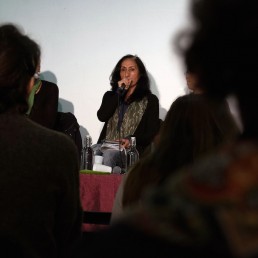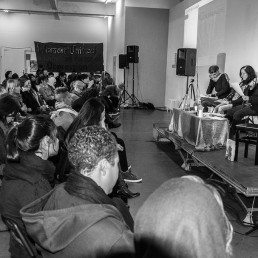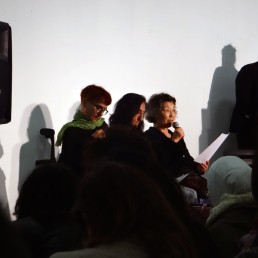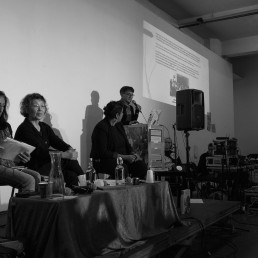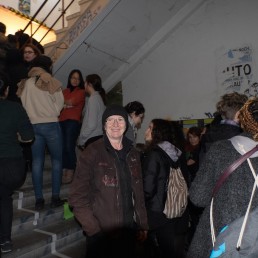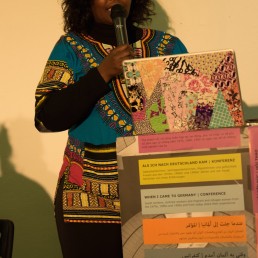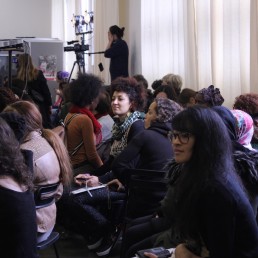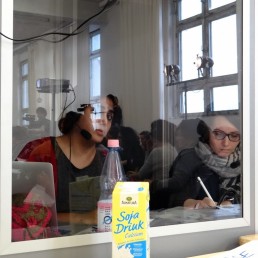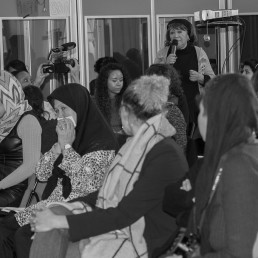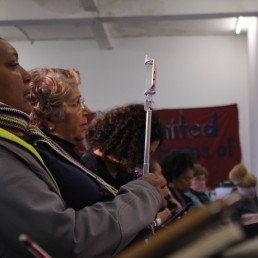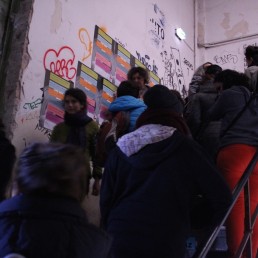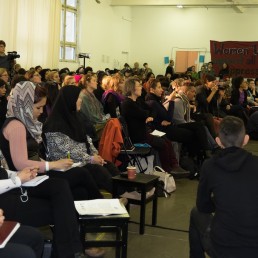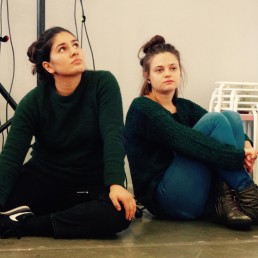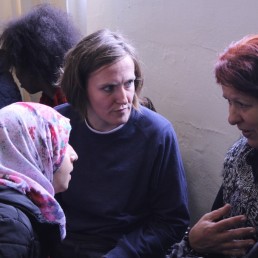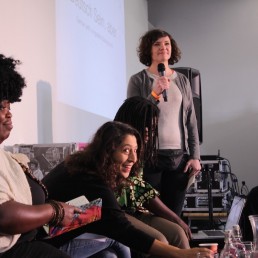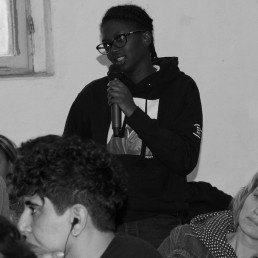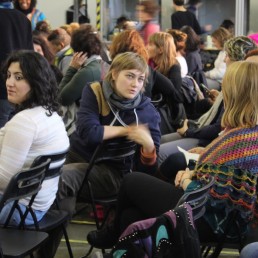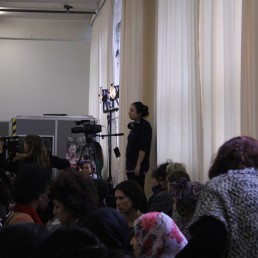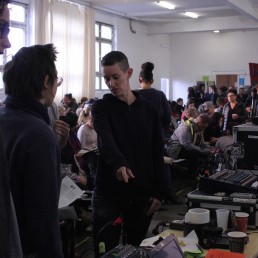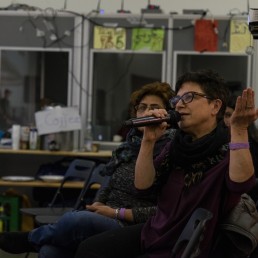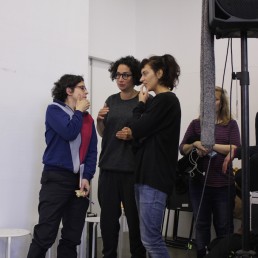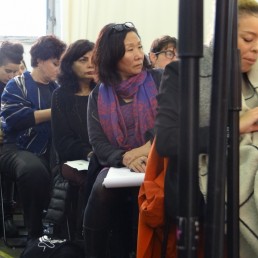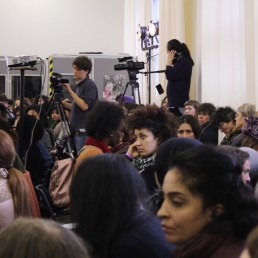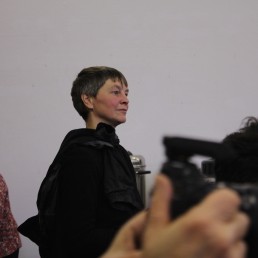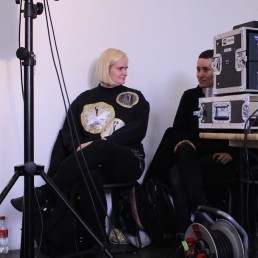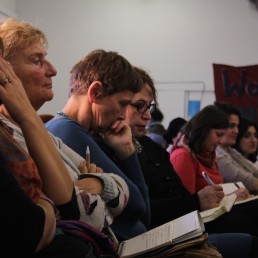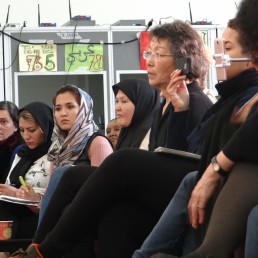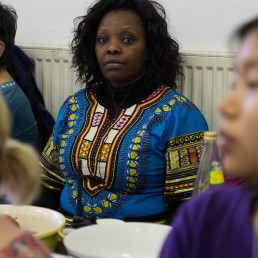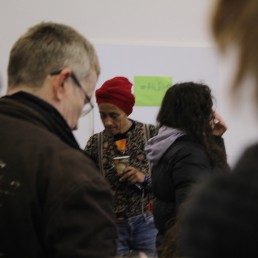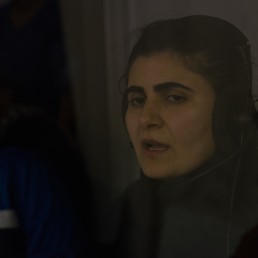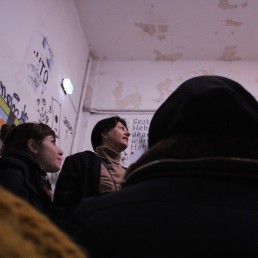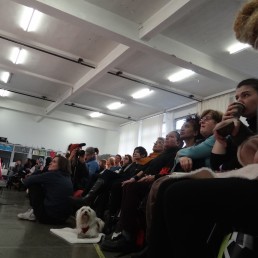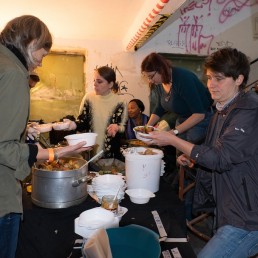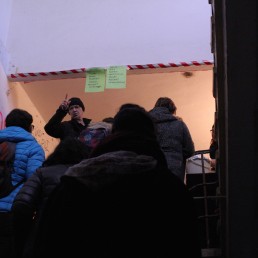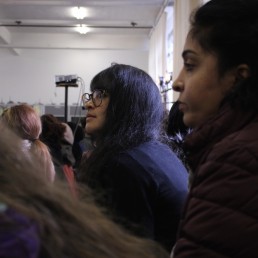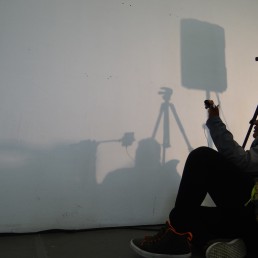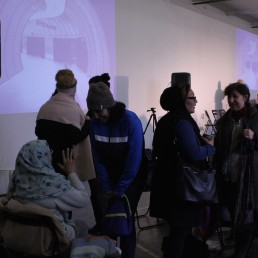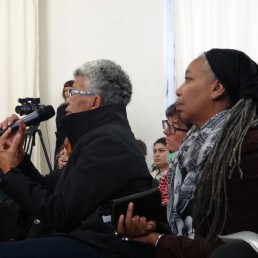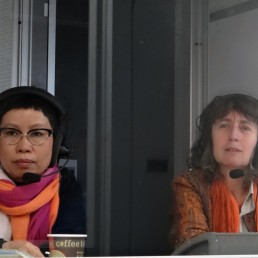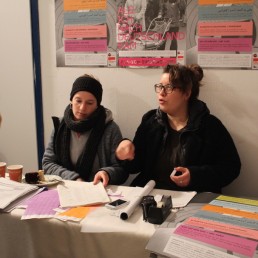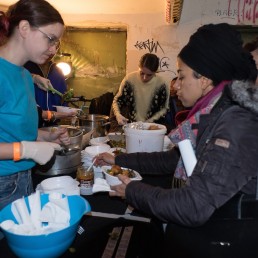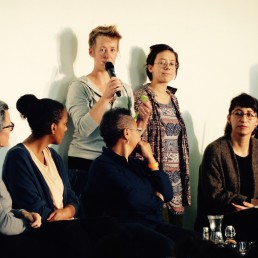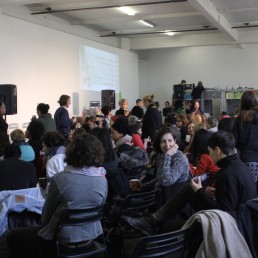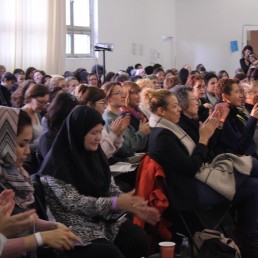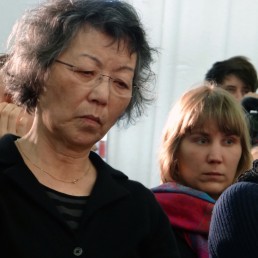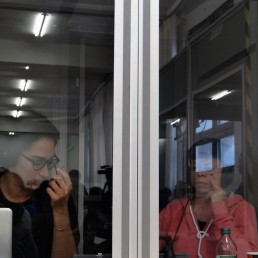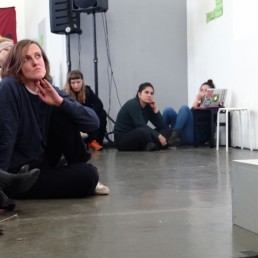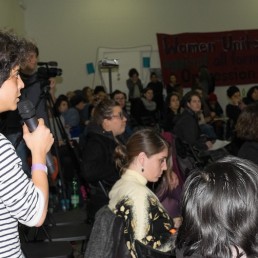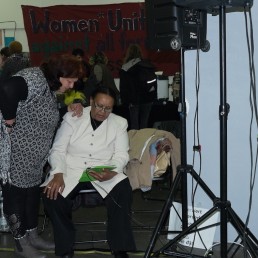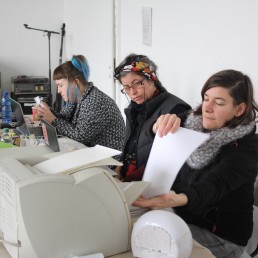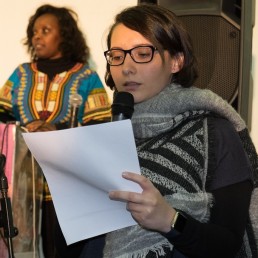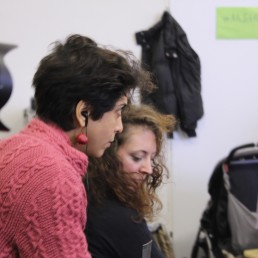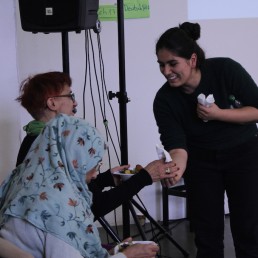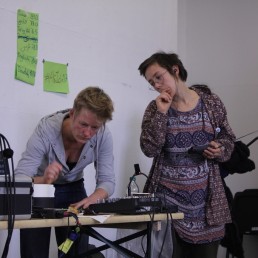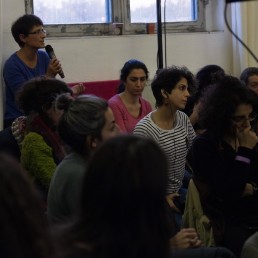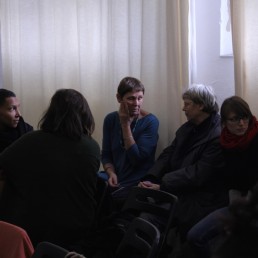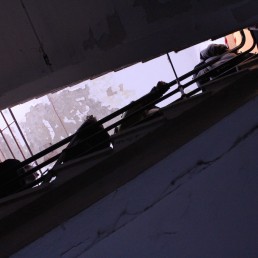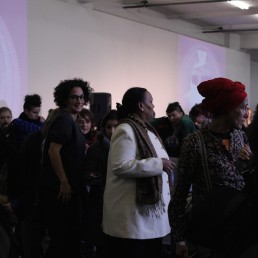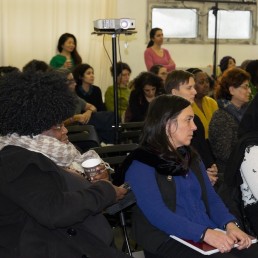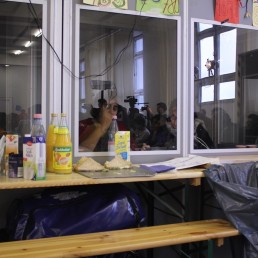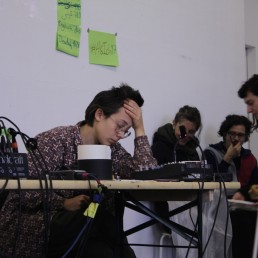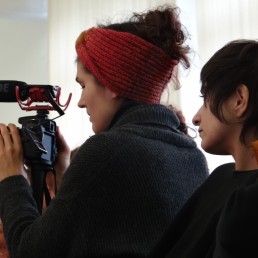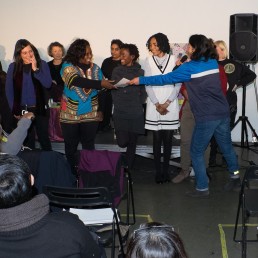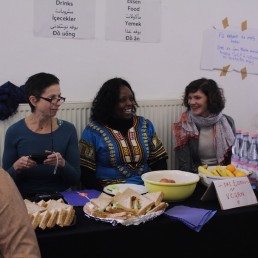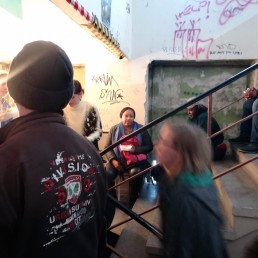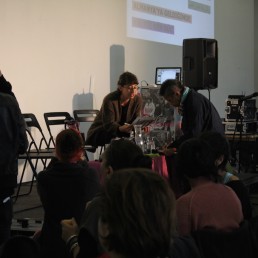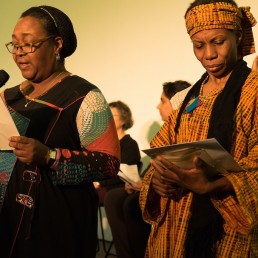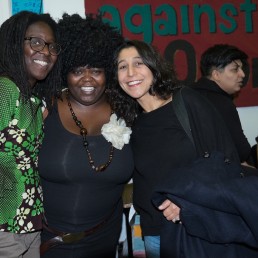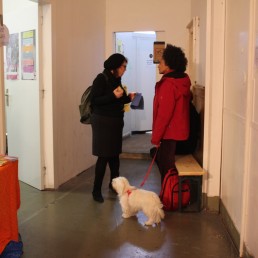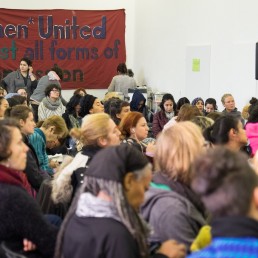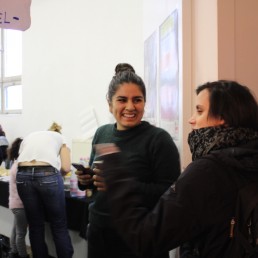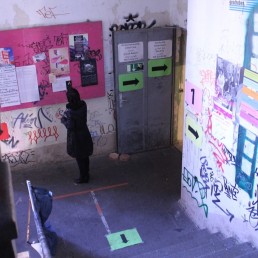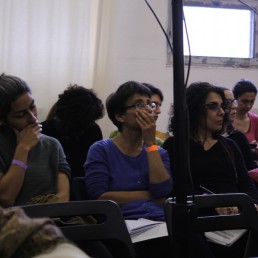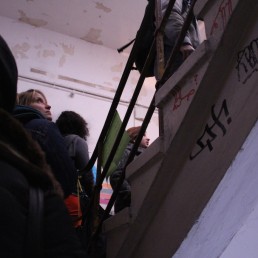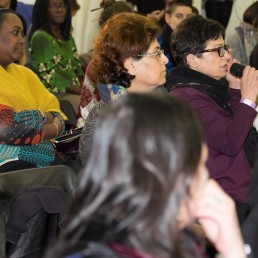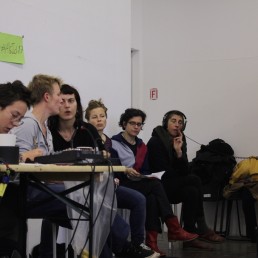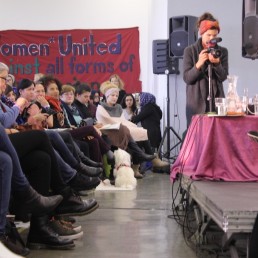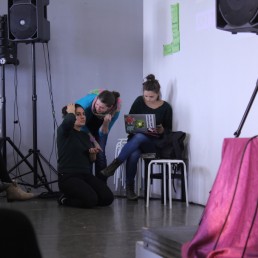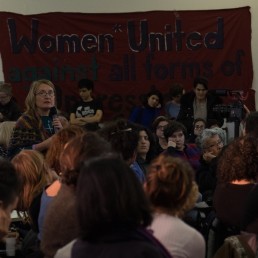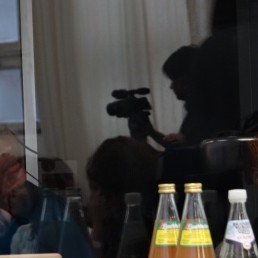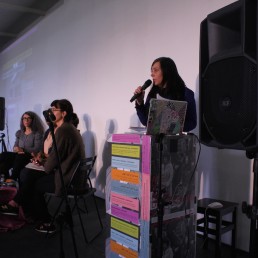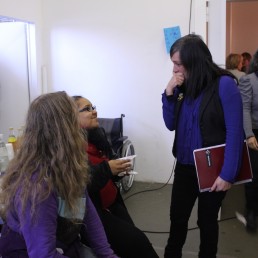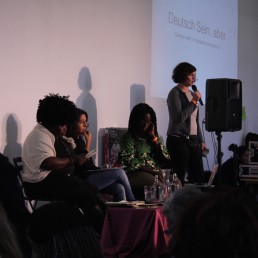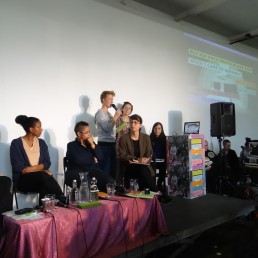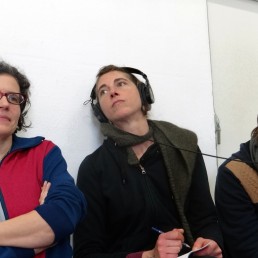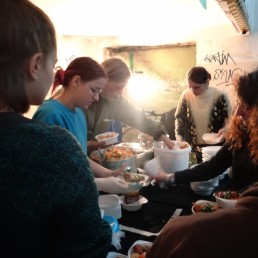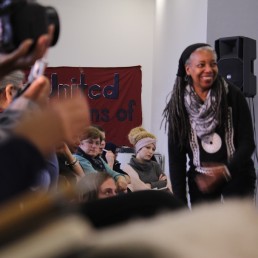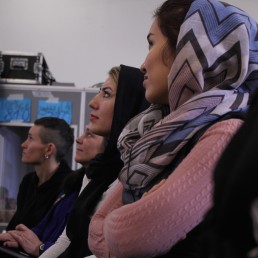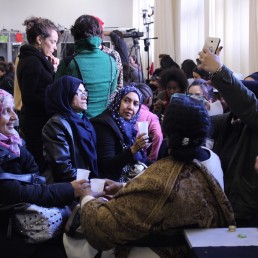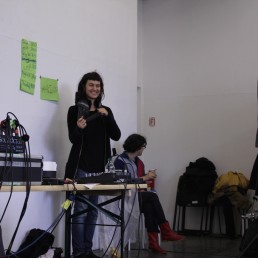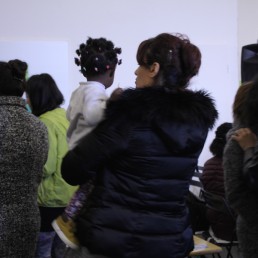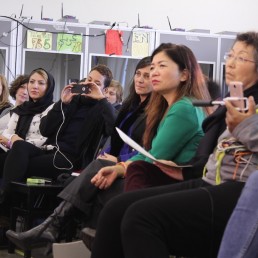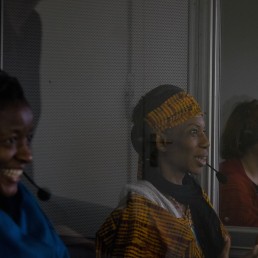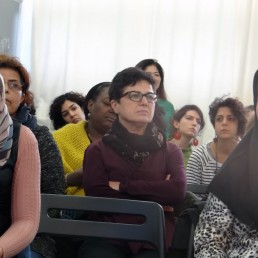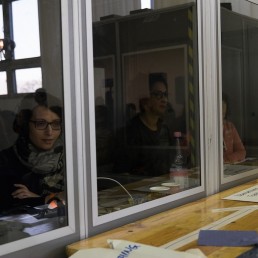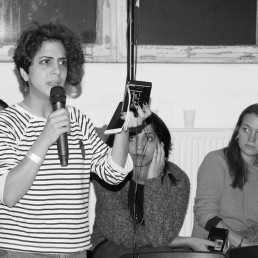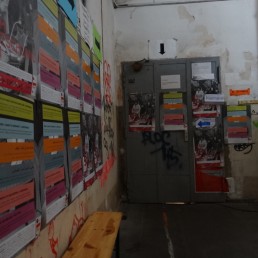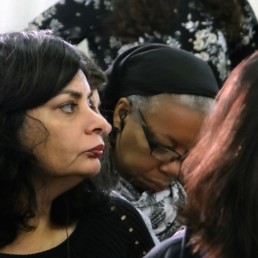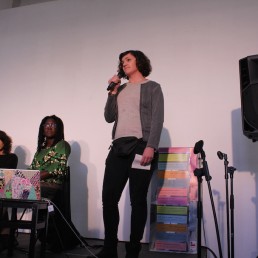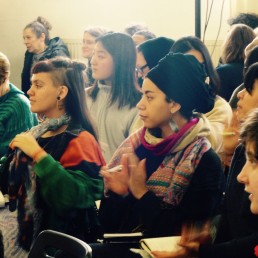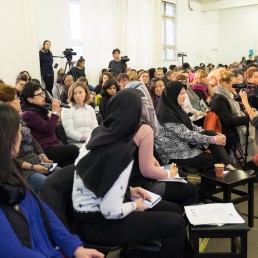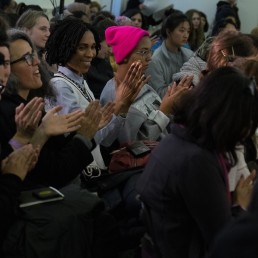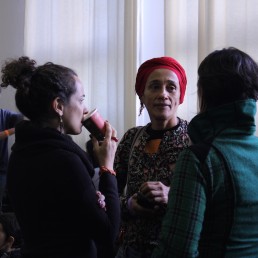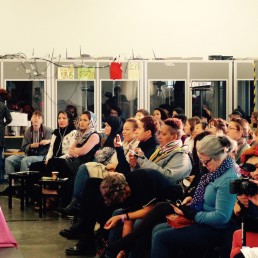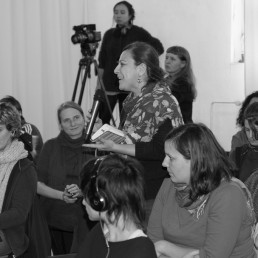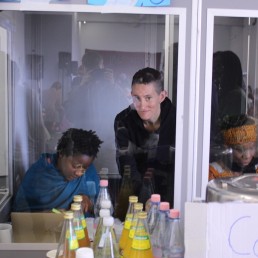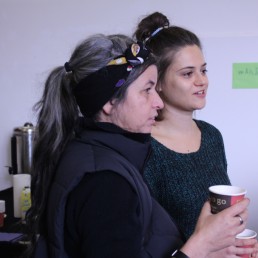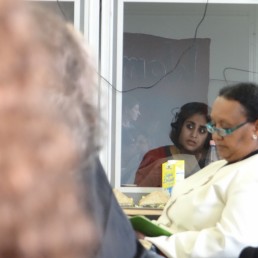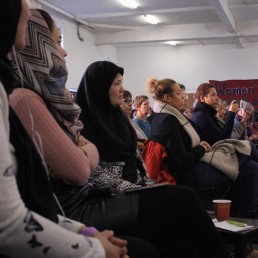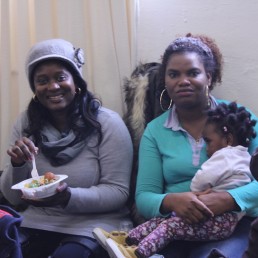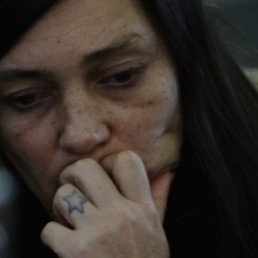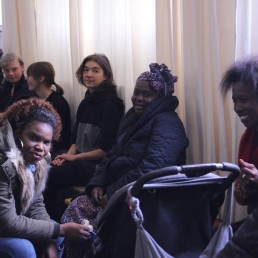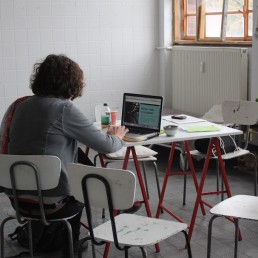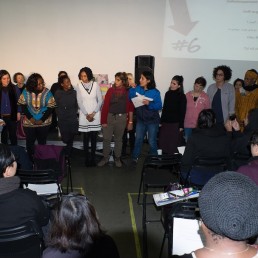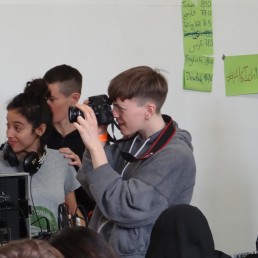GÖÇ BAĞLAMINDA ÖZ ÖRGÜTLENME VE FEMİNİST ÇALIŞMA
KONFERANS | ALMANYA'YA GELDİĞİMDE | EKİM 2017 | BERLIN
KONFERANSALMANYA'YA GELDİĞİMDEEKİM 2017 | BERLIN
Kendini tanımlama ve karşılıklı güçlendirmeye giden yol: Kadınlar gruplar ve inisiyatiflerle yaptıkları politik çalışmaları anlatıyor. Birbirinden farklı kuşaklara alanlar yaratmak için yürüttükleri bu süreci tarif edecek ve ortak bir çalışma üzerine perspektifler sunacaklar.
PANEL FOTOĞRAFLARI
KONUŞMACILAR & MODERATÖRLER
Konuşmacılar ve moderatörler hakkında Almanca ve İngilizce olarak hazırlanmış bilgiye ulaşabilirsiniz:
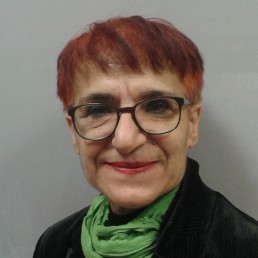
Gülşen Aktaş widmet ihr Leben dem politischem Aktivismus und der Frauenarbeit in Deutschland. Geboren in Dersim, wurde sie Grundschullehrerin in der Provinz Diyarbakır. Im Alter von 20 Jahren folgte Gülşen ihrer Mutter Şirin nach Deutschland, studierte Politikwissenschaft und arbeitete in einem der ersten Frauenhäuser in Berlin und war bei verschiedenen Immigranten- und Frauenprojekte tätig. Sie war aktives Mitglied von Schabbeskreis und war und ist in verschiedenen Frauengruppen vernetzt. Seit 2007 ist sie Leiterin von HUZUR, der ersten interkulturelle Freizeitstätte in Berlin, die von SeniorInnen aus ca. 30 Ländern frequentiert wird.
Gülşen Aktaş has dedicated her life to activism and to working with women in Germany. Born in Dersim, she trained as a primary school teacher in the province of Diyarbakir. At the age of 21 Gülşen followed her mother Şirin to Germany, where she studied political sciences and worked in one of the first women's shelters in Berlin as well as in several immigrant and women's projects. She was an active member of ""Schabbeskreis"" and is part of several women networks. Since 2007 she has been the director of ""huzur"", the first intercultural recreational center in Berlin, which is frequented by elderly people from about 30 countries.
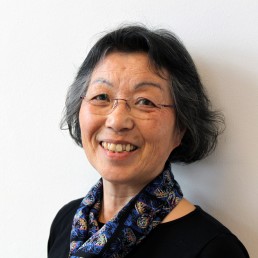
Kook-Nam Cho-Ruwwe wurde am 30. November 1948 in Kimcheon, Südkorea geboren und hat, bevor sie 1970 als Arbeitsmigrantin nach Deutschland kam, ihre Berufsausbildung als Krankenschwester absolviert. Über 40 Jahren war sie in verschiedenen medizinischen und pflegerischen Einrichtungen erwerbstätig. Sie ist Gründungsmitglied der koreanischen Frauengruppe in Deutschland und Vorstandsvorsitzende im Dachverband der Migrantinnenorganisationen (DaMigra e.V.). Sie beschäftigt sich mit Themen wie dem Pflegenotstand in Deutschland seit Ende der 1950er Jahre, der Anwerbung asiatischer Krankenschwestern aus Indien, den Philippinen und Korea und der Zwangsrückkehr asiatischer Krankenschwestern in ihre Herkunftsländer. Dabei organisiert sie verschiedene Widerstandsaktionen und hat für unkündbare Bleibe- und Arbeitsrechte in den Verwaltungsvorschriften zum Ausländergesetz gekämpft.
Kook-Nam Cho-Ruwwe was born on the 30th November 1948 in Kimcheon, South Korea. She completed her vocational training as a nurse before coming to Germany in 1970, after which she worked in various medical and nursing facilities for over 40 years. She is a founding member of the Korean Women’s Group in Germany and chairwoman of the umbrella organization of female migrant organizations (DaMigra e.V.). She is concerned with issues such as the shortage of nurses in Germany since the end of the 1950s, the recruitment of Asian nurses from India, the Philippines and Korea, and the forced return of Asian nurses to their countries of origin. As well as working on these topics, she has organised various resistance campaigns and has fought for irredeemable residence and workers‘ rights to be inscribed in German immigration law.
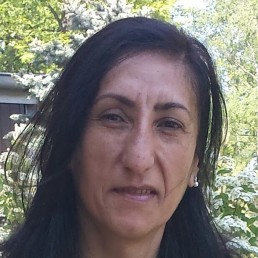
Seher Yeter wurde 1971 in Erzincan geboren. Sie zog im Alter von vier Jahren mit ihrer Familie nach Istanbul. Sie absolvierte die Grund- und Sekundarschule und zur Hälfte die Hochschule. Dann begann sie in der Textilindustrie in der Qualitätskontrolle zu arbeiten. Neben der Arbeit in der Textilindustrie setzte sie sich aktiv für den Frauenkampf, für Frauenrechte und Frauenfreiheit ein. Um sich in diesem Bereich fortzubilden, lernte sie von den Erfahrungen der Frauen in ihrem Land und anderen Teilen der Welt zu lernen. Sie lebt seit 17 Jahren in Deutschland und arbeitet hier weiterhin als Teil des Kampfes zur Befreiung der Frau. Sie ist aktiv im Verein Sozialistischer Frauen (SKB) und macht aufmerksam auf die Wichtigkeit des internationalistischen Frauenkampfes.
Seher Yeter was born in 1971 in Erzincan. She moved to Istanbul with her family when she was 4. She went to primary and secondary school, and completed half of high school. Then she started to work in quality control in the textile industry where she worked for a long time. Besides her work in textile factories, she was active working for the women's struggle, women's rights and women's freedom. In order to gain more knowledge in these topics, she learned to learn from the experiences, lives and struggles of the women in her country and the women in other parts of the world. She has been living in Germany for 17 years and she a part of the women's liberation struggle in Germany. She is active in the Socialist Women Association (SKB) and draws attention to the importance of the cause for the Internationalist women's struggle.
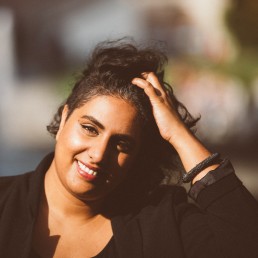
Saboura M. Naqshband studierte Arabistik, Politikwissenschaft und Sozial- und Kulturanthropologie in London, Kairo und Berlin. In Berlin und bundesweit ist sie als Antidiskriminierungs- und Empowerment-Trainerin tätig, darunter für Gladt e.V., Verein für LSBTI*Q-Geflüchtete und Migrant*innen, und als Übersetzerin für w_orten und meer gmbh (Verlag für antidiskriminierendes Handeln). Sie arbeitet v. a. zu den Themen (anti-muslimischer) Rassismus, Muslimischer Feminismus und Religion, Gender und Sexualität. Außerdem engagiert sie sich global in intersektionalen, feministischen Bündnissen und für die südasiatische Diaspora in Europa. Sie ist als Projektreferentin bei DaMigra für die Bereiche Projektmanagement, Vernetzung mit MSOs und Networking zuständig.
Saboura M. Naqshband studied Arabic Studies, Political Sciences and Social- and Cultural Anthropology in London, Kairo and Berlin. In Berlin and throughout Germany she works as an anti-discrimination and empowerment trainer, e.g. for Gladt e.V., association for LGBTI* refugees and migrants and as a translator for w_orten und meer gmbh [w_ords and sea corporation], an anti-discriminatory action publisher. She works particularly on topics such as (anti-Muslim) racism, Muslim feminism and religion, gender and sexuality. Moreover, she is active worldwide in intersectional feminist alliances and in the South Asian diaspora in Europe. As a project consultant at DaMigra she is responsible for the areas of project management, connecting with MSOs and networking.
PANELİSTLERİN GÖRÜNTÜLERİ
ÜBER DIE KONFERENZALMANYA'YA GELDİĞİMDE
International Women Space (IWS) Ekim 2017’de Berlin’de iki gün süren bir konferans düzenledi. Konferansta, misafir işçi olarak Batı Almanya’ya gelmiş kadınlar, Doğu Almanya’ya sözleşmeli işçi olarak gelmiş kadınlar, Almanya’nın birleşmesinden sonra gelmiş göçmen ve mülteci kadınlar ve ayrıca ırkçılığa uğramış Alman kadınlar altı panelden oluşan tartışmalarda deneyimlerini paylaştılar.
Katılımcılar, Almanya’ya geliş öykülerini, kadın olarak bu ülkedeki çalışma ve yaşam koşulları ile politik örgütlenme hakkındaki deneyimlerini paylaştılar. Bu deneyimlerin anlatılmasıyla farklı kuşaklardan göçmen kadınlara dair bilgiyi bir araya getirmeyi, karşılaştırmayı ve tarihsel bağlamda değerlendirmeyi amaçladık. Kadınlar olarak bizler, kişisel ve ortak deneyimlerimizi birbirimizle paylaşabileceğimiz bir alan istiyoruz. Ayrıca, ırkçılık, cinsiyetçilik ve yabancı düşmanlığı nedeniyle sesleri çoğunlukla duyulmak istenmeyen göçmen kadınların birer kurban olarak gösterilmesine de itiraz ediyoruz.
Çoğunlukla yapılanın aksine biz ırkçılığa maruz kalan göçmen, mülteci ve Alman kadınların sadece sorunları üzerine olan yaygın anlatıma karşı çıkarak kadın olarak işyerinde, toplumda ve devlet baskısına karşı sergilediğimiz farklı ve çok yönlü direniş biçimlerini göstermeyi amaçladık.
Büyük bir başarıydı! Konferans öncesinde, süresince ve sonrasında konferansa gösterilen tepkiler bizi fazlasıyla heyecanlandırdı ve bize ilham verdi. Konferansın her bir gününde biraraya gelen 250 kadın, Almanya’daki direnişleri ve siyasi mücadeleleriyle ilgili deneyimlerini paylaştı ve Doğu, Batı ve birleşik Almanya’daki farklı nesillerden kadınlar birbirlerinin tarihlerini öğrendi. Ayıca bu kadınlar birbirlerini tanımaya başladılar ve dil engeline rağmen Almanca, İngilizce, Arapça, Farsça, Türkçe ve Vietnamca olmak üzere altı dile ardıl çeviri sayesinde birbirleriyle ağ kurdular. Açıklık ve dayanışma atmosferi vardı, bu sayede hem konuşmacılar hem de katılımcılar kişisel deneyimleri hakkında özgürce konuşabildiler.
Katılımcılardan gelen geri bildirimler, böyle bir etkinliğin çok gerekli olduğunu ve sürekli deneyim paylaşımı, politik eylem ve ağ kurma yönünde güçlü bir istek olduğunu gösterdi. Konferansı bir başlangıç noktası olarak görüyoruz ve bir sonraki adımı dört gözle bekliyoruz …
KONFERANS FOTOĞRAFLARI | 2. GÜN
LICENSE INTERNATIONAL
This work is licensed under a Creative Commons Attribution-NonCommercial-NoDerivatives 4.0 International License.
LIZENZ DEUTSCHLAND
Dieses Werk ist lizenziert unter einer Creative Commons Namensnennung – Nicht-kommerziell – Keine Bearbeitung 3.0 Deutschland Lizenz.
